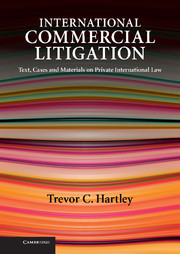Book contents
- Frontmatter
- Contents
- Table of panels
- List of figures
- Preface
- Acknowledgments
- Terminology
- Table of Latin phrases
- List of abbreviations
- Table of cases
- Table of cases (European Court of Justice, numerical order)
- Table of legislative instruments
- PART I STARTING OFF
- PART II JURISDICTION
- 2 Jurisdiction: an analysis
- 3 Jurisdiction under EC law
- 4 EC law: special jurisdiction
- 5 The traditional English rules
- 6 Developments in Canada
- 7 US law: an outline
- 8 Choice-of-court agreements
- 9 Forum non conveniens and antisuit injunctions
- 10 Overlapping jurisdiction in EC law
- 11 Special topics – I
- 12 Special topics – II
- PART III FOREIGN JUDGMENTS
- PART IV PROCEDURE
- PART V CHOICE OF LAW
- PART VI EXTRATERRITORIALITY
- Bibliography
- Index
5 - The traditional English rules
from PART II - JURISDICTION
- Frontmatter
- Contents
- Table of panels
- List of figures
- Preface
- Acknowledgments
- Terminology
- Table of Latin phrases
- List of abbreviations
- Table of cases
- Table of cases (European Court of Justice, numerical order)
- Table of legislative instruments
- PART I STARTING OFF
- PART II JURISDICTION
- 2 Jurisdiction: an analysis
- 3 Jurisdiction under EC law
- 4 EC law: special jurisdiction
- 5 The traditional English rules
- 6 Developments in Canada
- 7 US law: an outline
- 8 Choice-of-court agreements
- 9 Forum non conveniens and antisuit injunctions
- 10 Overlapping jurisdiction in EC law
- 11 Special topics – I
- 12 Special topics – II
- PART III FOREIGN JUDGMENTS
- PART IV PROCEDURE
- PART V CHOICE OF LAW
- PART VI EXTRATERRITORIALITY
- Bibliography
- Index
Summary
Introduction
In this chapter, we consider the basic common-law rules of jurisdiction as they developed in England over the centuries. Originally, these rules constituted a complete statement of the law of jurisdiction applied in actions in personam in England. As we have seen, however, they have now been replaced by European Community law where the defendant is domiciled in the United Kingdom or in another European State that is a member of the European Community or a party to the Lugano Convention. As a result, the traditional rules of English law now apply only with regard to defendants domiciled in other countries, such as the United States, Canada, Australia, Japan, China, Russia, India, Brazil, etc. However, since these latter countries make up by far the greater part of the world, the traditional rules are still of considerable importance; in many ways, they are more important than the EC rules we considered in the last two chapters. Moreover, they still constitute the foundation of the law in common-law countries like Australia, Canada and the United States.
Service of the claim form
The original attitude of the common law might strike some people as strange: jurisdiction was regarded as entirely a matter of procedure. An action in the common law was (and is) begun with the service (delivery) on the defendant of a claim form – originally, a writ of summons (writ) – a document issued in the king's (or queen's) name, ordering (summoning) the defendant to attend court at a specified time and place.
- Type
- Chapter
- Information
- International Commercial LitigationText, Cases and Materials on Private International Law, pp. 77 - 104Publisher: Cambridge University PressPrint publication year: 2009



